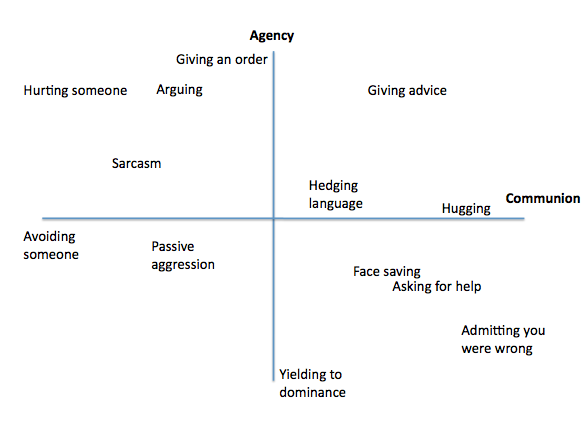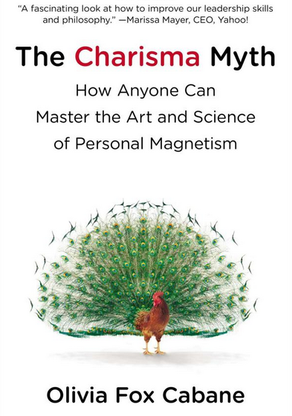Saying "Before Others Can Love You, You Have to Learn to Love Yourself" Is COMPLETELY FALSE.11/14/2017
Let's bust yet another popular psychology myth.
"Money doesn't buy happiness."
"Opposites attract." "Before others can love you, you have to love yourself." Popular psychology is full of myths and misperceptions. Money does buy happiness (if you know how to spend it). We like people who are like us (though, often, people who are complementary attract.) And saying, "Before others can love you, you have to love yourself," is ridiculous, and makes zero sense. From the evolutionary psychology perspective, self-esteem is worthless. When you need to hunt, gather, survive cold winters and overcome diseases, it doesn't matter if you love yourself. It matters if others love you. The reason humans exist is because we can communicate, collaborate, and form societies. It's the only way our offspring can be born so woefully unprepared for survival and require such extensive resources to reach sexual maturity. That's why one of the most important human emotions... is loneliness. People who didn't get lonely don't exist anymore. They didn't spend time and effort attracting mates. They didn't devote enough time and care to their offspring. And they died, childless and alone. People who got lonely formed and maintained close connections -- so they survived! Meaning there was a strong selective pressure for us to be extremely sensitive to loneliness. Which is why, unless you're a psychopath or sociopath, you're obsessed with what others think of you. I know what you're thinking: "Not me! I don't care what anyone thinks." Psychologist Mark Leary used to hear that a lot, too. So he set up an experiment. He recruited participants to complete a questionnaire that measured how much people thought they were affected by what others think of them. Then, he selected the people who reported being highly unaffected, as well as those who reported being highly sensitive. Next, those participants sat alone in a room and talked about themselves into a microphone for five minutes. Each minute, a “listener” would give a 1–7 rating of how much he/she would like to meet the participant, as well as other feedback. As is often the case in psychology studies, there was no “listener.” Leary had rigged the study to either show dropping or rising ratings, and followed up with a measure of self-esteem. Not surprisingly, people who reported a high sensitivity to others’ opinions had a huge drop. But. The so-called mavericks had drops almost as big. Somewhat surprisingly, Leary also found that, while negative feedback significantly lowered participants’ self-esteem, positive feedback didn’t produce an increase in self-esteem. Leary concluded that the “sociometer” operates at an unconscious level, and is highly sensitive to cues that your relational value is low or declining. (That said, there are definitely ways you can begin to care -- or at least notice -- less what others think of you.) This study underscores that, even if we say we don't care what others think (and I definitely say and feel that)... we actually do. (And, on the other side of the coin, hearing negative gossip about others literally changes the way we see them.) So what exactly is self-esteem for? Why should you learn to love yourself before you can expect others to love you? According to Roy F. Baumeister et al.'s 2003 meta-analysis, Does High Self-Esteem Cause Better Performance, Interpersonal Success, Happiness or Healthier Lifestyles, there is no relationship between high self-worth and achievement. In fact, high self-regard is commonly found in narcissists, bullies and sociopaths -- hardly the easiest people to love. Nevertheless, people with high, unwarranted self-esteem tend to have an inflated sense of popularity and likability. They get hostile when criticized or rejected. They alienate others. "Learning to love yourself" could actually hurt your chances of convincing others to love you. Weird, right? So, sure. Some studies show that people with high self-esteem do generally pursue closeness and connection in romantic relationships more than low self-esteem counterparts -- especially when facing threatening circumstances (Murray, Holmes, & Collins, 2006). But... High self-esteem, though related to some positive relationship behaviors, is only weakly linked to overall relationship health (Campbell & Baumeister, 2004). People can actually behave destructively when they feel their partners have threatened their self-esteem or failed to show special treatment. High self-esteem can impede forgiveness and prolong minor disagreements (Exline et al., 2004). Plus... going back to the original argument. If no one loves you, why would you love yourself? After all, as I wrote in For the Love of God, STOP Asking People If They're Okay (Ask This Instead): All of human interaction can be graphed on an X-Y axis, where X is communion (actions that show caring and bring us closer to others) and Y is agency (actions that establish power vs. submissiveness)... If your life is legitimately lacking in communion, you're going to feel bad. Sure, you can build up character and you can take pride in your accomplishments... But without someone to share those victories and setbacks with, everything will feel less good. You evolved to feel that way. (Though, of course, people with depression often have dysfunctional beliefs and perceptions -- they can be surrounded by people who love them, but still feel unloved. Funny story, though: antidepressants and SSRIs might accidentally make people more lonely.) Considering all this, it might make a LOT more sense to say, "Before you can love yourself, you have to find someone who loves you." After all, even surfing and basketball are more fun with friends. *** THAT SAID. There are definitely reasons people say you have to learn to love yourself. There are certainly things you need to learn to do before someone can love you -- especially if you're struggling with feelings of depression, low self-esteem, and loneliness. For example: 1. You need to learn to say goodnight, even if you're super lonely and it hurts to go home. There's this horrible cycle some lonely people fall into. Being at home, alone, is so painful and demoralizing... that when someone finally does invite them out, they refuse to say goodnight. They either ignore or miss overt cues that the other person is tired, ready to go home, or ready for you to leave their home. And while this brings temporary satisfaction day-of... the long-term consequence is that the person doesn't get invitations, anymore. Trust me. There's a decently long list of people whose calls I don't answer, because I know they won't respect me when I say, "I have to go! Bye!" (Hint: When someone says goodbye, the conversation is over.) There are people who don't get invited over because after I said, "Wow! I'm getting tired!" I had to say, "I'd better get to bed! I'm getting up early tomorrow" -- then, finally, a half-hour later, "LEAVE." Show some respect, or you won't get a lot of invites. 2. You need to learn to have reasonable expectations for friends and dating partners spending time with you. When you're lonely, it hurt to be alone -- which means you might be driving people away by demanding too much of their time. For example, as I wrote in 7 Things That TOTALLY SUCK About Self-Employment, I've known several people who thought that just because I'm self-employed, I could hang out with them all afternoon. It's actually vaguely insulting. Like, you realize I'm not unemployed, right? But even if you work a regular job, we all know someone who's bombarded us with way too many invitations. It's... uncomfortable. (Of course, if you've met someone an TOTALLY hit it off, you should definitely feel comfortable texting them before they even get home to say what a wonderful time you had or asking, "When can I see you again?!" when you say goodnight -- but you have to keep it proportional. If they're not like, "OMG, tomorrow!" then maybe back off some. Authenticity and respect matter, and dating mind games are the hugest turnoff ever.) 3. You need to learn to mingle, instead of cling. As I wrote in You'd Get Invited to More Parties If You'd Mingle, Instead of Cling, "Hey, man. There's this really cool Exeter party on Friday. I'd totally invite you... but, honestly, you're kind of a clinger, and I don't want to have to babysit you." Of course, if you're worried about appearing to "abandon" your date upon arrival, you can always use your words and ask: I was on my way to some fancy pants Silicon Valley party once, and my date asked me, "Is there anything you're hoping to achieve tonight? Are you working on anything you'd like me to mention to people?" If you're a clinger, people won't invite you to things, and you'll get more lonely. So go mingle! 4. You need to learn to stop talking about sad shit all the time. This one is a little less common, but I've seen it enough that it's worth mentioning. People don't go out to parties, dinners, and events because they want to feel sad. They go out because they want to have fun! So if you're the guy who whips out a sob story about how you've been wronged by so many people, so many times... stop. It means fewer people will want to talk to you, and you're less likely to be invited out by these people again. I almost sort of don't blame you -- your friends have been accidentally positively reinforcing the negative behavior for years. When you talk about how heartbroken and sad you are, people feel "guilty" walking away. When you're talking (yet again) about your medical condition, people "feel bad" interrupting. Unconsciously, you learn that when you talk about sad shit that brings everyone down, you get more attention... so you keep doing it. Meanwhile, though, what other people are learning is how to tell a captivating story or a good joke. They're learning how to flirt and interact in brief, but engaging, ways. They're learning charisma, and how to make people feel good, instead of sympathetic. If you need help with this, check out Olivia Fox Cabane's The Charisma Myth: How Anyone Can Master the Art and Science of Personal Magnetism: Or! Stop saying "I". James Pennebaker wrote in his awesome book, The Secret Life of Pronouns: What Our Words Say About Us, that psycholinguists (and computers) can distinguish depressed people from healthy people based on how often they say "I". I can't speculate on correlation vs. causation. But I can say that it makes sense that someone who is in pain would be more self-focused than someone who wasn't. But what "I" translates to in many situations is you boring others with tales of how amazing and interesting YOU are... or you boring others with tales of how victimized and unfortunate YOU are. And part of havign charisma is making other people feel good and interesting, too. As Cabane wrote in The Charisma Myth: IN THE TORRID London summer of 1886, William Gladstone was up against Benjamin Disraeli for the post of prime minister of the United Kingdom. This was the Victorian era, so whoever won was going to rule half the world. 5. You need to learn to have interesting experiences, knowledge, expertise, and opinions. Lots of people feel like they're "not interesting" and "don't have much to say." This is primarily a confidence problem... but it could have a basis in reality. What do you do in your free time? Play Candy Crush? Scroll through your newsfeed? Or read incredibly interesting books and articles? Do you fill your face with pretty makeup and your hair with pretty bobbles? Or do you fill your mind with ideas? Because if you have nothing to say, your looks aren't going to hold anyone's interest for long. So, go ahead. READ. Here are some books I've enjoyed recently:
Now, DO. Make epic weekend plans. Try a new sport or craft or hobby. Go abalone diving or mountain biking. Write music or make thought-provoking art. Easier said than done, right? When you're depressed or lonely, it's hard to get moving, thinking and doing. Which makes it hard to think of anything to talk about. Except yourself. So you bring people down and drive them away, and the cycle continues. Let's break the cycle now. 6. You need to learn not to get hurt and offended all the time. If people feel like they need to walk on eggshells around you, they're not going to invite you to hang out. Simple as that. So, next time someone says something that hurts you, ask yourself these two questions: 1. Is it true? 2. Are you sure? Because there is a 99% chance the thing the person just said wasn't meant to hurt you. Besides, words only hurt if you let them. *** So, yes. It's completely inaccurate to say that before you can ask someone to love you, you have to learn to love yourself. But there are certainly things you can learn to make yourself more lovable.
4 Comments
Jadzia
11/16/2017 04:33:23 am
I have a friend who will never pick up on hints that it's time to go home. Once my husband and I were almost falling asleep and he didn't take the hint. Eventually, I learned that I just had to ask him to leave when I wanted him to do so. He is fine about that, he picks up his stuff and goes pretty quickly when asked. Sometimes, I mention when he arrives that it can't be a late night as my husband has to get up early for work so he won't expect to stay until late.
Reply
11/16/2017 02:18:51 pm
It's great you're so comfortable "addressing the elephant in the room" -- a lot of people aren't, and yours is a super valid point I now wish I'd mentioned in the post. (Maybe I'll throw in an edit!)
Reply
Tom
2/4/2023 05:12:56 am
I really like the article because its so straight-forward in giving advice. I know I shouldn't really look at articles to find "happiness", but shit, your article about todays teens was so precise, it's horrific.
Reply
Juliet
7/8/2024 12:32:45 pm
Great work………
Reply
Leave a Reply. |
About the Author

Eva is a content specialist with a passion for play, travel... and a little bit of girl power. Read more >
Want to support The Happy Talent? CLICK HERE!
Or Find me on Patreon!
What's Popular on The Happy Talent:
Trending in Dating and Relationships:
What's Popular in Science: Playfulness and Leisure Skills:
Popular in Psychology and Social Skills:
Categories
All
|
































 RSS Feed
RSS Feed